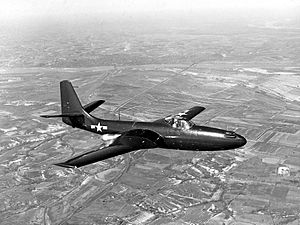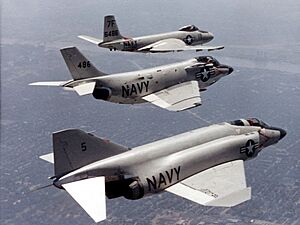McDonnell Aircraft Corporation facts for kids
Wordmark used until 1950s
|
|
| Industry | Aerospace |
|---|---|
| Fate | Merged with Douglas Aircraft Company |
| Successor | McDonnell Douglas |
| Founded | July 6, 1939 |
| Founder | James Smith McDonnell |
| Defunct | April 28, 1967 |
| Headquarters |
,
United States of America
|
|
Key people
|
|
The McDonnell Aircraft Corporation was an American company that built aerospace products. It was located in St. Louis, Missouri. James Smith McDonnell started the company on July 6, 1939.
McDonnell Aircraft was famous for its military fighter jets, like the F-4 Phantom II. They also built spacecraft for astronauts, such as the Mercury capsule and Gemini capsule. In 1967, McDonnell Aircraft joined with the Douglas Aircraft Company to create McDonnell Douglas.
Contents
History of McDonnell Aircraft
James Smith McDonnell first tried to start a company in 1928. It was called J.S. McDonnell & Associates. His idea was to make small planes for families. But a big economic downturn in 1929, called the Great Depression, stopped his plans. His company failed, and he went to work for another aircraft company.
In 1938, James McDonnell decided to try again. He started the McDonnell Aircraft Corporation in St. Louis, Missouri, in 1939. World War II helped his new company grow a lot. It went from only 15 employees in 1939 to 5,000 by the end of the war. They made many aircraft parts. They also developed a fighter plane called the XP-67 Bat and a guided missile called the LBD-1 Gargoyle.
After the war, McDonnell Aircraft faced tough times. The government stopped ordering as many planes, and there were too many aircraft already. The company had to cut many jobs. But then the Korean War started, which helped McDonnell become a major supplier of military fighter jets again.
In 1943, McDonnell began working on jet planes. The US Navy asked them to design a new jet. McDonnell eventually built the successful FH-1 Phantom after the war. This jet introduced a special design that McDonnell used often. Its engines were placed forward under the plane's body and exited just behind the wings. This design worked well for other planes like the F2H Banshee, F3H Demon, and the F-101 Voodoo.
David S. Lewis joined the company in 1946. He helped create the famous F-4 Phantom II in 1954. This jet started being used in 1960. Lewis became a top leader at the company, eventually becoming its President in 1962.
McDonnell also made several missiles, like the early Gargoyle and the unique ADM-20 Quail. They also studied how to fly extremely fast, which is called hypersonic flight. This research helped them get a big part of NASA's space projects. These included Mercury and the Gemini. The Mercury capsule was very successful. Because of this, the company changed its logo to show the capsule orbiting a globe. Their new motto was "First Free Man in Space."
McDonnell was now a very large company. However, they had a problem: they had almost no business outside of military contracts. This meant they were at risk if the government stopped buying military products.
Meanwhile, Douglas Aircraft was having money problems. They were also struggling to build enough planes to meet demand. In 1963, the two companies started talking about joining together. They seemed like a good match. Douglas's non-military business would help McDonnell if military orders slowed down. McDonnell's military contracts would give Douglas much-needed financial stability.
Douglas officially agreed to McDonnell's offer in December 1966. The two companies officially merged on April 28, 1967. They became the McDonnell Douglas Corporation (MDC). McDonnell's leaders took charge of the new company. It was based at McDonnell's facility in St. Louis. James McDonnell became the chairman and CEO.
McDonnell Douglas later merged with Boeing in August 1997. Today, Boeing's defense and space division is located at the old McDonnell facility in St. Louis. It continues to make products for defense and space. Some famous planes from McDonnell Douglas's history include the F-15 Eagle, AV-8B Harrier II, F/A-18 Hornet, and F/A-18E/F Super Hornet.
Products Made by McDonnell Aircraft
Aircraft
| Model name | First flight | Number built | Type |
|---|---|---|---|
| McDonnell XP-67 | 1944 | 1 | Prototype fighter with two piston engines |
| McDonnell FH Phantom | 1945 | 62 | Fighter with two jet engines |
| McDonnell XHJH-1 Whirlaway | 1946 | 1 | Helicopter with two piston engines |
| McDonnell F2H Banshee | 1947 | 895 | Fighter with two jet engines |
| McDonnell XH-20 Little Henry | 1947 | 2 | Experimental light helicopter with two ramjet engines |
| McDonnell XF-85 Goblin | 1948 | 2 | Experimental fighter with one jet engine |
| McDonnell XF-88 Voodoo | 1948 | 2 | Experimental fighter with two jet engines |
| McDonnell F3H Demon | 1951 | 519 | Fighter with one jet engine |
| McDonnell XV-1 | 1954 | 2 | Experimental plane that could fly like a helicopter |
| McDonnell F-101 Voodoo | 1954 | 807 | Fighter with two jet engines |
| McDonnell 120 | 1957 | 2 | Experimental light helicopter with three ramjet engines |
| McDonnell F-4 Phantom II | 1958 | 5,195 | Fighter with two jet engines |
| McDonnell 119 | 1959 | 1 | Experimental business jet with four engines |
Crewed Spacecraft
- Mercury capsule
- Gemini capsule
- ASSET spaceplane
Missiles and other items
- ADM-20 Quail
- LBD Gargoyle
- TD2D/KDD/KDH Katydid target drone (a drone used for target practice), 1942
See also
- Sanford N. McDonnell, nephew of the founder and later a leader at McDonnell Douglas.
 | Percy Lavon Julian |
 | Katherine Johnson |
 | George Washington Carver |
 | Annie Easley |



